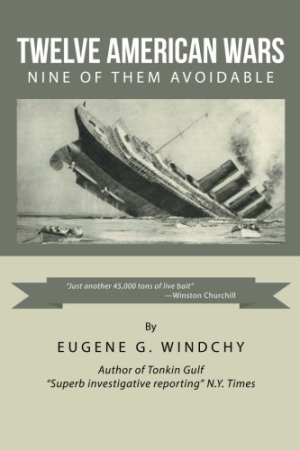
Twelve American Wars
Nine of Them Avoidable
One by one, Windchy harshly evaluates all the US wars and the personalities that shaped them.
“Rough tough, we’re the stuff. We want to fight and we can’t get enough. Whoopee!” The war cry of Lt. Col. Theodore Roosevelt’s Rough Riders, who may or may not have actually been involved in the battle of San Juan Hill during the Spanish-American War, might be representative of not only a few rogue soldiers but also the fickle nature of American public opinion and the foolishness of many US leaders.
Eugene Windchy exposes a few trigger-happy troops and a rogue general or two, but his analysis in Twelve American Wars is not necessarily about American troops and engagements. He looks at the events and decisions that led to war. As Windchy puts it, he has studied “how the shooting started and how it might have been prevented.”
Perhaps because he has previously written an acclaimed study of the Tonkin Gulf crisis, the pretext for the Vietnam War, Windchy begins this survey with discussion of the so-called “unprovoked” attack on the USS Maddox, which was said to be on “routine patrol” in the Tonkin Gulf. The author shows how closed-door meetings of the secret “303 Committee” of politicians and generals orchestrated provocative air raids and gunboat attacks on North Vietnam.
Windchy then undertakes a chronological analysis of such little-known conflicts as the First Barbary War (“not a war of choice”) and the First Mexican-American War, part of which led to US acquisition of the “ungovernable nuisance” California, the paradise that neither Spain, Mexico, nor Russia wanted badly enough. Windchy devotes much of his energy to “our greatest national catastrophe,” the Civil War, and finally to World War I, which he argues we tried to prevent, and claims that our participation saved the Allies from certain defeat.
While the author works from some traditional historical sources, his research includes much diary, memoir, and oral history, which give the study a personal edge. Present at Fort Sumter in the run-up to the Civil War was Captain Abner Doubleday, a Unionist and veteran of the First Mexican-American War who would later be credited, erroneously, with founding America’s national pastime of baseball. Doubleday’s memoir contributes greatly to Windchy’s description of the political and military situation in Charleston in the weeks before the first shot was fired.
But Windchy’s own opinions are sharp and well considered. President McKinley, pressured to engage in the Spanish-American War, was “ignorant.” Senator William Fulbright, Windchy admitted, was “overmatched” in debate, but accurate on policy. President Buchanan was “lethargic,” “feckless,” and “culpable” in allowing Southern states to take over federal military facilities as they prepared for secession. William Seward, secretary of state under Lincoln, was an “overbearing busybody” who felt that he, instead of Lincoln, should have been president.
Windchy makes history interesting by pointing out ironies, little known facts, facts hidden from the public, and conspiracies. In the case of each war, he interprets and evaluates American motives. But his purpose is not to impress or entertain. Windchy advocates the study of war to prevent war. “Only three of those twelve wars were unavoidable,” he says. “In the nuclear age, we need to do better.”
Reviewed by
Joe Taylor
Disclosure: This article is not an endorsement, but a review. The publisher of this book provided free copies of the book and paid a small fee to have their book reviewed by a professional reviewer. Foreword Reviews and Clarion Reviews make no guarantee that the publisher will receive a positive review. Foreword Magazine, Inc. is disclosing this in accordance with the Federal Trade Commission’s 16 CFR, Part 255.
